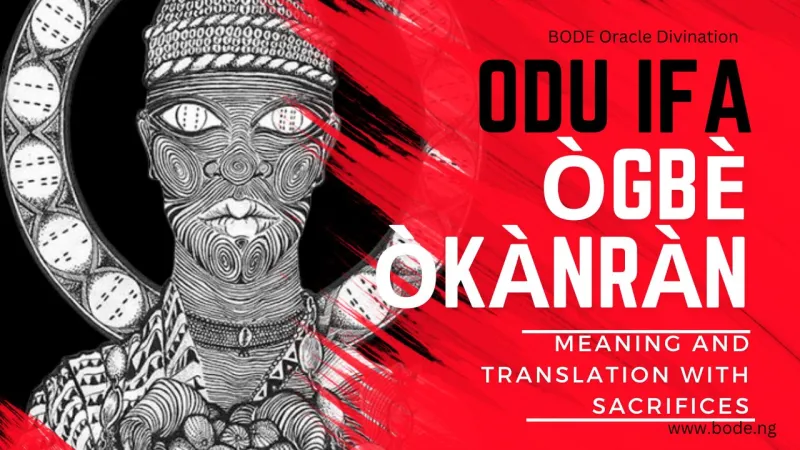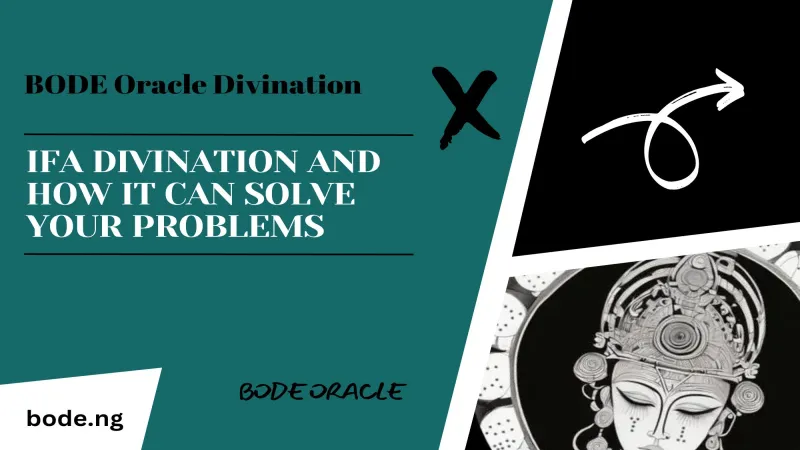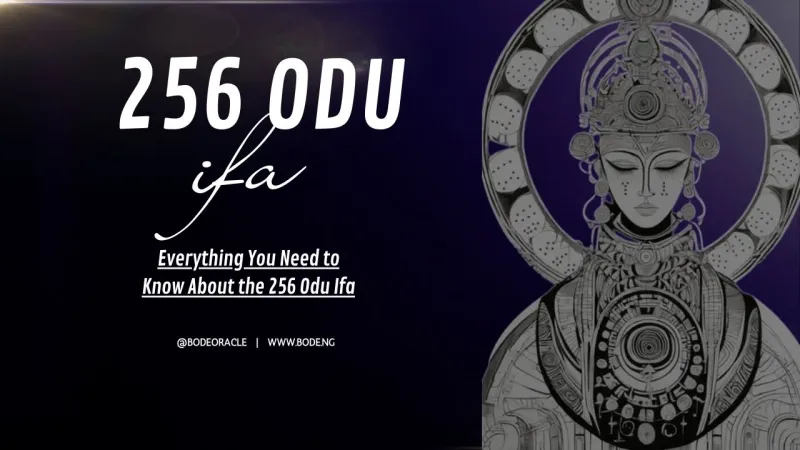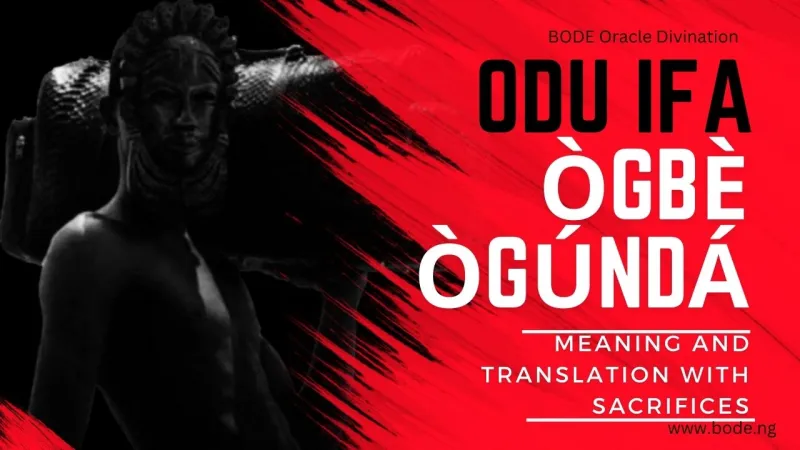Ogbe Okanran, also known as Ogbe Kanran, is a significant Odu in Ifa Divination that symbolizes transformation and the resolution of adversities.
It recounts the historical struggles faced by the people of Ife and the divine guidance received through Ifa rituals. By embracing the teachings of Ogbe Okanran, individuals can overcome challenges, solidify their identities, and pave the way for prosperity and well-being in their lives.
Ogbe Okanran, Ogbe Kanran: Ifa Awujẹ
Ifa states that good fortune and blessings of children for the one who Ogbe Okanran was casted for, known as Ogbe Kanran.
Ifa says that an offering should be made. Ifa says that a journey is what one is currently preparing for; they should make offerings so that their intentions may prosper, and so that they may prosper with children.
Let us share food,
let us share trade.
This was the Ifa cast for Awujẹ,
Who is going to the farm of Alero with intentions that year.
It is said that the offerings will sustain us;
A lack of offerings cannot sustain a person.
Awujẹ, whom Ifa speaks of, does not have a child. She put two and three together, she went to the Ifa priest and ask Ifa, "How will I have children, and how will I go on this journey? Will my offerings sustain me there?.
They said she would have children there, and they told her to make offerings. She made the offerings, and it was not long before Awujẹ became very fruitful.
She came to thank the diviners, and the diviners of Ifa said, "Indeed, they said this:
Let us share food,
let us share trade.
This was the Ifa casted for Awujẹ,
Who is going to the farm of Alero with intentions that year.
It is said that the offerings will sustain us;
A lack of offerings cannot sustain a person.
It is not long; it is not far.
Come join us among the children, We will thrive among the children of Obàrià.
Ogbe Okanran, Ogbe Kanran: Ifa Oro
Ifa states that it sees good fortune for the person that received Ogbe Kanran. Ifa declares that It will remove the individual from their adversaries. Ifa proclaims: "Ifa said this person will conquer all their enemies. Ifa advises that an offering should be made.
Ọtapẹtẹmoso
This was the Ifa cast for Ọró.
The message that Ifa conveys regarding Ọró, is that Oro was surrounded by adversaries who prevent Oro from recognizing the solutions to his challenges. They do not allow Oro to be at ease.
Ọró contemplated deeply about what actions he could take until he found his way to the residence of an Ifa priest. They performed Ifa for him, revealing that the witches were hindering him, and that he should make offerings.
An offering of traditional palp with Ifa casted in it, the palp was mixed with abéré and red pepper. Ọró should drink and consume all these mixed elements.
Ọró took the mixture, and once he did, the enemies could no longer approach him.
The essence of that day is the fangs of the Oro tree today. The pulp from that day became the vital essence that emerges from the Oro tree.
The spice of that day is what renders the Oro tree so lethal to the eye.
Ogbe Okanran, Ogbe Kanran: Ifa Ọlágbégi
The stone at the edge is a shield.
This was the Ifa cast for Ọlágbégi,
Who is going to Òkitì Ẹfón,
Who is going to meet them at the place of settlement.
Ọlágbégí is a person of significance. In his town, there are many adversaries due to his name.
This name is what people use to express their anger against him, claiming he has not yet arrived anywhere, and that he will become a great person in line with his name. The enemies do not allow him to rise. He pondered on what he could do.
When he combined two with three, he went to the abode of Ifa priest. They told him to leave this town, to go to another town, and to make offerings.
They said that once he made offerings, it would solidify his name, and that name would be what would elevate him to greatness.
Once he accomplished this and became great, he would eventually revert to his original name. When Ọlágbégí made offerings, he solidified his name.
When he arrived in another town, that is when he began to flourish. Everything of his prospered, and he became a great person.
He thanked the diviners, and the diviners thanked Ifa, Ifa thanked Elédùmarè, the King of Heaven.
When he reached the land of Òkitì fón, they asked him, “What is your name?” He responded that his name is Ọlájùwéré. They honored him with land and farmland. He then settled there. He was the one who remained a king in the land of Ọwọ.
Ọlágbégí (the Olowo of Òwò) remains the king of Owo town till today. Ifa declared that he would conquer all his enemies. Ifa advised that this person should make offerings and ensure to make substantial offerings as instructed by the diviners and heed to this sacrifice.
Ogbe Okanran, Ogbe Kanran: Ifa Ife Ooye Lagbemoro
Ifa states that the person who recceived Ogbè Òkànràn in divination should make offerings due to the misfortunes faced by this individual.
The transformation is the manifestation of the spirit.
The totality is the manifestation of the spirit.
This was the Ifa cast for Ogbè
On the day he went to confront death, misfortune, and distress, in Ife Oòyè Lagbemoro.
In ancient times, the people of Ife faced many adversities, and they were in despair, the people of Ife asked a diviner to consult an oracle for them.
When they consulted Ifa, they invoked Ogbè-Kànràn. Ifa instructed them to kill a big male goat, they should call upon the odus of ifa into it, and to go and knack it at the city’s gates.
They should knack it to the large tree behind the city’s wall. The people of Ife acted according to what Ifa instructed. From the day they made this offering, misfortune and untimely death, along with all other adversities, ceased to affect them.
They then reflected on what name they would call this Odu; they decided to name it Ogbè-Kànràn because it represented the confrontation with death, misfortune, suffering, and distress in Ife Oòyè Lagbemoro.
YORUBA Translation
Ogbe Okanran, Ogbe Kanran: Ifa Áwújẹ
Ifá pé óun pé ire ọmọ fun ẹni tí ó dá Ogbè OKánrán ti a npe ni Ogbè-Kánrán. Ifá pé ẹbọ ni kí ò rù. Ifá pé ìrin ájò kan ni eni nan fé lọ, kí ó rù’bọ kí ibè le ba san án sí owó, kí ó san án si ọmọ.
Ká bù’jẹ, ká bù tà
A d’Ífá fún Áwújẹ
Tí ó ńlọ oko áléró l’ódún
Ó ní rírú ẹb níí gbe ni
Áìrú kìí gbè eniyán
Áwújẹ tí Ifá ńsọ yii ojú ọmọ ńpọn kò rí ọmọ bí. Ló bá mú ééjí kún ééta, ó lọ oko awo wipe bawo ni òun yí óò ṣe rí ọmọ bí àti wipe óun fé rin irin àjò, ǹjé ibè yi óó san òun ni ó dá Ifá si.
Wón ní á a ri mọ bí ní ibè, wón ni ẹbọ ni kí ó rú. Wọn yàn án l’ẹbọ, ó sì rú ẹb náà. Kò pé tí Áwùjẹ di ọlọmọ púpò.
Ó wá nyin Awo, Awo nyin Ifá, ó ni béè ni wón wi:
Ká bù’jẹ, ká bù tà
A d’Ífá fún Áwúj
Tí ó ńlọ oko áléró l’ódún
Ó ní rí’rú ẹbọ níí gbe ni
Áìrú kìí gbè eniyán
Ko pé o, ko jina
Ẹ wá bá wa laarin ọmọ
Áárin ọmọ làá bá ní lẹsẹ Ọbárìṣà
Ogbe Okanran, Ogbe Kanran: Ifa Oro
Ifá pé óun pé ire iṣégun òtà. Ifá pé òun yi óó yọ ó laarin òtá. Ifá pé
òun yí óò jé ki ó ri ojútùú ayé e rè. Ifá pé ẹbọ ni ki ó rú.
Ọtapẹtẹmoso
A d’Ifá fún ọró
Ọró tí Ifá s’óró rẹ yií, àárín tá ẹlẹyẹ ni ó wá dé ibi wipe wọn kò jẹ ki ó rí ojútùú ayé ré. Wọn kò jẹ kí ó nilaari. Ọró ro’nú titi wipe kini òun lè ṣe, loba ko’ri si ilé alawo. Wón dá Ifá fún, wóni òtá ẹlẹyẹ ló ńba já wipe ẹbọ ni ki ó rú.
Kí ó rú ékọ fifọ, ata pupa, abéré lópòlọpọ. Oró tó’jú gbogbo nkan wonyi. Ni wòn bá rú’bọ fun. Wọn ṣe Ifá fun sinú èkọ fifó: wón fá èkọ yii pò mọ abéré, ni wón bá ní kí Ọró gbé èkọ náà mu.
Ọró gbé ẹkọ náà mu. Bi ó ṣe mu ú tán, áwọn ẹlẹyẹ kò lé dé òdọ ré mó. . abẹrẹ ọjó yẹn ni ègún tí ó wà ní ara ọró di òni. Ẹkọ ọjó náà ni ó di oje ara ré, ata ọjó náà ni ó wà lára oje rè ti kò fi gbodo dá si ojú.
Báyii ni áwọn ẹlyẹ kó lè dé ódò oró mọ, tí ọró sí ṣégun àwọn ẹlẹyẹ pátápátá.
Ogbe Okanran, Ogbe Kanran: Ifa Ọlágbégi
Ido apata abidí jẹjẹrẹ
A dIfá fún Ọlágbégi
Ti ńlọ Òkitì Ẹfón
Ti ńlọ rèé bá wọn mílẹ ibùdo
Ọlágbégí yií ènìyàn ni. Ninú ilú ré, awn ótá pò fún nitori Orúkọ rè. Orúkọ yii ni áwọn èniyàn fi ńbinú ré wipe koni tíì dé ibikan, ti yi óò fi di ẹni la gẹgẹbí orùkọ ré, Àwọn òtá kó jẹki ó dide. Ó wa ronú wipe kini òun lé ṣe.
Ni ò bá mú ééjí kún ééta ló lọ oko awo. Wón ni kí ó kùrò ninú ilú yìí ki ó lọ si ìlú mìíràn, ki ó sì rú’bọ. Wipe tí ó bá ti rú’bọ, yi óò si pa orúkọ rè dá, òtò ni orùkọ ti yi óò ma jẹ ti yi óò fi di ẹni ńlá. Tí ó bá ti rí ṣe tán ti ó di ẹni ńla, yi óò wá ma padà jẹ orúkọ ré.
Ni Ọlágbégí bá rú’bọ, ó pa orúk ré dá. Ìgbàtí ó dé ilú miran, báyìí ni ó bèrè si rí ṣe. ti gbogbo ńkan rẹ ńdára, tí ó si di eni ńla.
Ó nyin Awo, Awo nyin Ifá, Ifá nyin Elédùmarè ọba l’órun.
Nigbati ó de òde Òkitì Èfọn, wọn bí í léèrè pé. “kinni orúkọ rẹ o?” Ó dahun wipe Ọlájùwéré ni orúkọ òun jẹ. Ni wón bá bu ilè átí ilè oko fún. Ló bá tè’lù dó sibe náà. Òun ló wá kù ti ńjẹ ọba ni òde Ọwọ.
Ọlágbégí (Ọlọwò of Òwò) Ifá pé òun yi óò bá eni nan ṣé’gun òtá. Ifá pé ẹbọ ni ki ó rú, ki ó si ma fi eti pàlábá bọ tí awon awo bá ni ki ó rú.
Ogbe Okanran, Ogbe Kanran: Ifa Ife Ooye Lagbemoro
Ifá pé ẹni tí á dá Ogbè Òkànràn ki ó rú’bọ nitori ajogun ibi fún eléyiun.
Àdán l’awo arà riri rá riri
Ògbigbì l’awo arà riri rá riri
A d’Ífá fún Ogbè
L’ójó ti ó ńlọ rèé kan ikú, kan ófò, kan òràn, ni Ifè Oòyè lagbèmoró.
Ni ayé àtijó àwọn ara Ifẹ ni àwọn ajogun pò fún, ti wón ndá wọn laamu, ni àwọn ara Ifẹ bá ranse pé Awo wipe kí ó bá áwọn bèrè l’ówó Ifá. Ígbàti wọn ó dá Ifá, wọn da Ogbè-Kànràn.
Ifá ni ki wọn ó pa órúkọ (òbúkọ) ńlà kan, ki wọn ó pe iyé Ifá sì, ki wọn ó lọ rèé fi sẹnu odi ilú. Kí wọn kàn-àn mó ígí lá l ehin odi ilú.
Ni àwọn ará Ifé bá ṣe ohun tí Ifá wí. Láti ọjọ ti wọn ti ṣe irúbọ yii ni òfò, ikú òjìji, pelu gbogbo ibi yooku kò ti ṣẹlé sí wọn mó, ni wón bá e áṣàrò wipe orúkọ wo ni wọn ó ma pé Odú yí, wọn ni Ogbè-kánrán ni torípé óun ló lọ rèè kan ikú, tó kan òfò, tò kan ìyà, tó kan òràn n’Ífẹ Oòyé Lagbèmoró.



